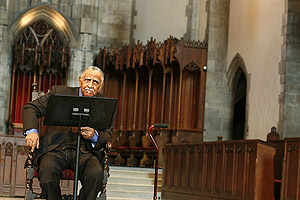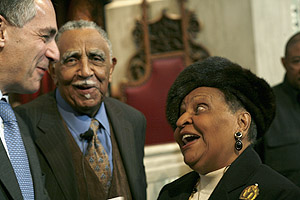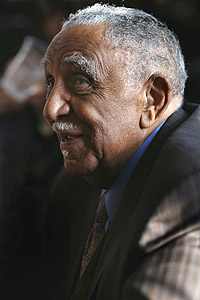‘Honor the Preacher, But Heed the Sermon’
Rev. Joseph Lowery echoes message of fellow civil rights activist at MLK Commemoration Service
By Phil Rockrohr
Martin Luther King Jr. was more comfortable serving the common good than being served, said the Rev. Joseph Lowery, civil rights activist and keynote speaker at the University’s MLK Commemoration Service on Thursday, Jan. 15, at Rockefeller Memorial Chapel.
“Martin’s understanding of the historic equipped him to illuminate the past, elucidate the present and envision the future,” said Lowery, who co-founded the Southern Christian Leadership Conference with King in 1957. “His pursuit of justice for the least led him into the fire of political combustion and fiscal frenetics.
“Martin gave hope to the hopeless, power to the powerless. He had a fire in his belly that fire hoses couldn’t wash out, police couldn’t beat out, bombs couldn’t blast out, jails couldn’t lock out and, thank God, money couldn’t buy out.”
Lowery urged the audience of several hundred not to rest at simply honoring King on his birthday. The national holiday puts “flesh and blood” on the United States’ commitment to racial justice and dedication to liberty and justice, he said.
“With this honor, America stood at the altar of nationhood and reiterated her vows to secure life, liberty and the pursuit of happiness for all,” Lowery said. “By doing this, the nation vows to love justice, honor truth and obey the laws of the land, including civil rights laws, and to do so in good times or bad and for better or worse ... until death us do part.”
 The Rev. Joseph Lowery, a civil rights activist who co-founded the Southern Christian Leadership Conference with Dr. Martin Luther King Jr., was the keynote speaker at the University’s MLK Week commemoration service at Rockefeller Memorial Chapel on Thursday, Jan. 15. | |
 President Zimmer, who spoke at the commemoration service for Dr. Martin Luther King Jr., greets the Rev. Joseph Lowery and his sister, Doris, at the event, following Lowery’s speech. | |
 The University’s student gospel choir, Soul Umoja, opened the MLK commemoration service with a medley of spirituals, including “Over My Head,” sung during the procession into the chapel. |
Don’t be tempted to place King on a pedestal of “sentimental irrelevance,” Lowery warned. Don’t make the mistake of honoring the messenger and the missionary, but discarding the message and the mission, Lowery urged listeners.
“As chaplains of the common good, we are called upon to honor not only the preacher but to heed the sermon,” he said. “Martin’s message and the meaning of the holiday lose their power when we don’t apply them to public policy and private practice.”
President Zimmer agreed the holiday and King’s legacy serve multiple purposes. “This is an opportunity not only to reflect on the past, but to consider our hopes for the coming years, and to reflect on what we are doing as individuals and a community to fulfill Dr. King’s vision of a nation and world that is one of great social justice,” Zimmer said.
 In reference to King, the Rev. Joseph Lowery urged the audience gathered in Rockefeller Memorial Chapel “to honor not only the preacher but to heed the sermon.” |
|
King’s message is reflected in the University’s four charter schools and in its partnership with the city of Chicago and the South Side to develop affordable housing, build a better healthcare network, make the community a better place to live and create a more diverse and vibrant intellectual environment at the University, he said.
“Dr. King said, ‘Whatever affects one directly affects all indirectly. I can never be what I want to be until you are what you want to be,’” Zimmer quoted. “This is the interrelated structure of reality. As Dr. King did, we on the South Side collectively understand that a strong community rooted in a common vision is a powerful force.”
Lowery, who is scheduled to deliver the benediction at the inauguration of President-elect Barack Obama on Tuesday, Jan. 20, said he hopes to hear more from Obama as president about the increasing gap between the rich and the poor than he did during his campaign.
“Chaplains of the common good must call on the nation to address the issue of the moral nature of poverty,” he said. “In the name of Martin Luther King, we must address the inequities in the criminal justice system. Education holds the key to unlocking the pathways out. Yet in our country poor people have the poorest schools, and we continue to see an assault on efforts to close that gap.”
R’mani Haulcy, an eighth-grade student at the Carter G. Woodson Middle School, one of the University Charter School campuses, dedicated her poem, “Change Is Here,” to Obama and King.
“My skin has gone from being worth nothing at all to being worth gold, because finally history has been made by a black man whose words aren't about jail or what drugs he’s sold,” Haulcy read. “I feel beautiful, powerful, intelligent and magnificent because I am a strong African American woman, and I know that this can finally be seen in a positive way.”
![[Chronicle]](/images/sidebar_header_oct06.gif)